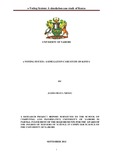| dc.description.abstract | It is generally considered that a key component of electronic government in the future will be
electronic voting, as a means of facilitating the participation of citizens in elections and
public debates. The rapid advancement in information and communications technologies has
given rise to new applications that were impossible just few years ago. One of these
applications is e-voting. The term ―e-voting‖ is defined as any voting method where the
voter’s intention is expressed or collected by electronic means. This project report details the
requirements, design and simulation of a generic and secure electronic voting system a case
study of Kenya where voters can cast their votes anytime, anywhere and using a number of
electronic devices including private computer networks, web and mobile phones. | en_US |

